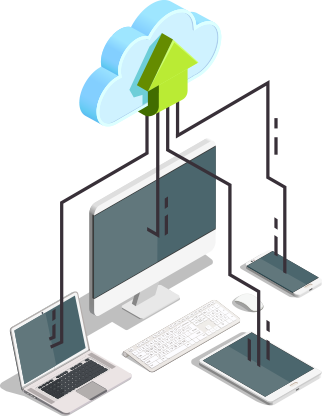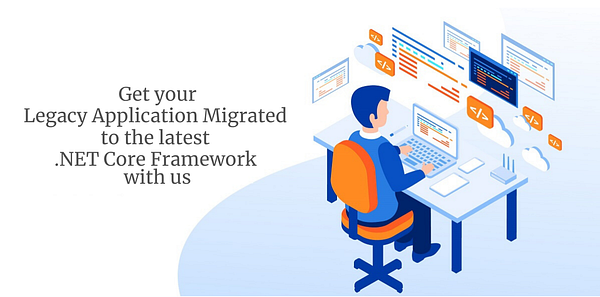Are you Looking for Application Migration Services? Then You are at right place.
What is application migration?
The process of moving the software application from One computing environment to other is know as Application migration . You may, for instance, migrate an application from one data center to other, from the on-premises server to a cloud provider’s environment, or else from the public cloud to a private cloud environment.
Secure, on-schedule, and hassle-free application migration services

The process of shifting an application program from one environment to another is called application migration. The need for application migration arises when the existing applications fail to provide the scalability and flexibility needed to meet the requirements of modern-day businesses.
In most cases, moving applications on newer and advanced platforms is the answer. In other cases, organizations may move their existing applications to private, public, or hybrid cloud environments to achieve the desired scalability and resiliency. And sometimes, applications and operating systems may need to be re-platformed and upgraded. For all of these cases, Infomaze can help you successfully redeploy applications from their existing environment to another environment.
Being a leader in application migration, we use open source cloud migration tools and plan a well-orchestrated migration strategy and move your applications to faster workloads with minimal costs and zero risks.
Read An Intresting Case Study on Application Migration to the latest .NET core framework
The Customer
The client is a large enterprise that had to manage huge data chunks that were present both on the cloud and on-premise legacy systems and were using an outdated .NET application built-in Visual Basic 6.
The Challenge
The client had been using Google storage to store a part of their data while a lot of their important data including their customer data, and the company data, were still not backed-up in the cloud. This heavily caused an inconvenience to our client, as they had to spend more time and energy in porting from one data source to another to fulfill their business needs.
Our client wanted to put an end to the use of legacy systems in their organization and instead wanted to rehost using a SaaS cloud-based application migration. One of the main reasons to choose application migration was, their MIS application was built using an older version of Visual Basic, VB6, which did not possess backward compatibility with the latest version of the .NET framework. Also, for this very reason, our client did not have cross-platform access for their MIS application which was a huge downside for the growth of the company. The client reached out to us with the above concern as our developers are well versed in AWS application migration, and application migration to Azure, to name a few.
The Requirements
The client wanted to eliminate the use of legacy systems in their organization by migrating their outdated .NET application to the cloud with additional features in the application using the latest .NET Core framework package that will make their MIS application compatible across multiple platforms. Our client also required a complete migration deployment with backend data migration to the cloud platform of their choice i.e., Google Storage Platform.

Technologies and tools used
Our expert developers used ETL technology along with the application migration tools such as Oracle DIPC inside the Microsoft Azure platform to migrate their legacy application data to the cloud and Azure App Services Visual Basic upgradation companion (VBUC) to migrate the existing server-side web application in an agile manner to the latest .NET Core framework.
Hire Experienced OFFSHORE DEVELOPERS
The Solution
First, using the App Service Migration Assistance from Microsoft Azure, our experienced developers determined what the data migration process will involve and made an efficient workflow chart to follow. The next step was to migrate the application data from their legacy system into the existing cloud service that they had been using and with the help of Oracle DIPC inside the Microsoft Azure platform, our developers migrated their data to the Google Cloud Platform. Before data migration, we also helped them with data cleansing from their on-premises directories.
Secondly, using the Azure App Services VBUC, our dedicated developers carried out moving the application to the cloud through an automated migration of their MIS application built with the older VB6 to the latest .NET Core framework providing cross-platform accessibility along with adding new features to the application that our client had requested.
With our app migration services, the client benefited from migrating to a lightweight and scalable .NET Core framework that provided a high-performance application with better networking and security from managing authentication, authorization, HTTPS enforcement, data protection, anti-request forgery protection, app secrets to CORS management, and a flexible Management Information System that provided efficient management of their cloud data and easy gateway to reach actionable insights.
Results
Our client found a solution that provided 100% user satisfaction with Infomaze. The lift and shift of their legacy system and application migration to the cloud, saved time for our client as they no more had to access on-premises data and the data stored on the cloud, separately, to achieve an increase in their ROI.
As our client was not constrained to a single-platform audience anymore, their outreach increased in size after migrating to an MIS application that provided cross-platform compatibility including Linux and Windows and built by our developers using the latest supportive Visual Studio.
With the additional features added to their MIS application for better managing their cloud data, the client could enjoy efficient workflow management in their business enterprise which helped them reach a holistic cost reduction in their company expenses including their labour expenses, sales expenses, and production expenses, to name a few.
This article Application Migration to the latest .NET core framework originally appeared in Infomaze Elite Website
Even Referred APPLICATION MIGRATION SERVICES Page
Comments
Post a Comment